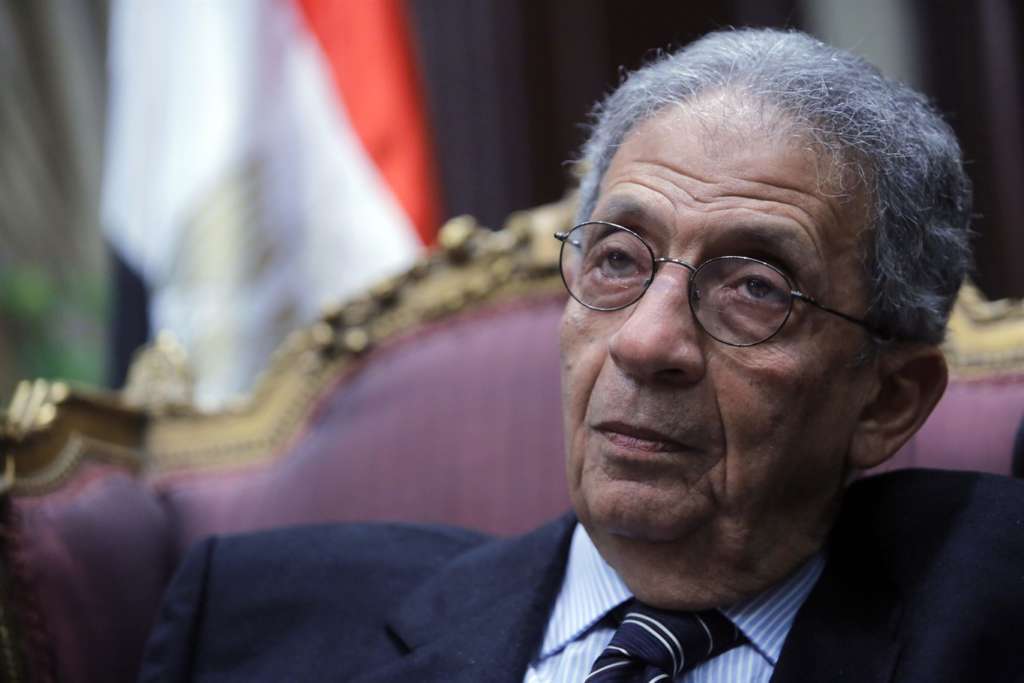Cairo– Prominent Egyptian Diplomat and Political Figure Amr Moussa has recently published his first memoirs, recounting his long journey with diplomatic work.
The book, entitled “Kitabiyah”, is the first volume of the veteran diplomat’s memoirs, that will be issued successively, and presents stages of his biography and work on the Egyptian, Arab and international arenas.
The first part of the biography recounts Moussa’s birth in 1936 until his departure from the Egyptian foreign ministry in 2001.
The book consists of 655 pages, including the cover, in which the author narrates various topics and encounters with different personalities from the Egyptian, Arab and international scenes.
Perhaps the most remarkable of these are the fact that they are almost exclusively revealing the characteristics of a number of Arab leaders and politicians.
The book says that in November 1994, while Israel was looking to establish an economic group called the “Middle East Market” to bring Arab and African countries closer to Israel, Moussa – then Egypt’s foreign minister – sought to activate coordination between Saudi Arabia, Egypt and Syria, to respond to “Israel’s attempt to strike at the entity of the Arab League.”
“I went to Saudi Arabia and met with the late King Fahd bin Abdulaziz, and informed him that Shimon Peres seeks to end the era of the Arab region, and this requires coordination between Cairo and Damascus and Riyadh… The King replied: I agree to hold the conference, but it must take place in Egypt; because it is our great sister,” Moussa recounts.
“I replied to the king that I had come under the direction of President Mubarak to propose that the meeting be held in Saudi Arabia. I would then go to Syria to coordinate the conference. The King replied: It must be in Egypt.”
On the relations between Egypt and Qatar, Moussa says: “There was a great deal of cooperation between me and Hamad bin Jassim, the former foreign minister of Qatar”.
“And I was always teased him by saying: “Enough gathering wealth!” And he replied: “I want to become the richest man in the Arab world,” according to the memoirs.
“Once I asked former Emir of Qatar Hamad bin Khalifa: Did Hamad bin Jassim achieve the billion or not? Bin Khalifa replied laughing: “The son of the… will not rest until he becomes the richest Arab man.”
Egyptian-Iranian relations were among the topics addressed by Moussa, especially during the Mubarak era.
He recounted in his memoirs an incident that revealed how sensitive Mubarak was to this issue.
“In May 1992, as I was about to complete my first year at the head of Egyptian diplomacy, I met with then-Iranian Foreign Minister Ali Akbar Velayati on the sidelines of a conference of non-aligned countries in Jakarta at one of the social events held during these summits,” Moussa recounts.
“We shook hands and talked, and then agreed that the matters of mutual interest required a bilateral meeting between us. The Iranian minister was puzzled as to where we could sit together, as there were no diplomatic relations between our two countries. I asked him to have the meeting in a cafeteria in the lobby of the hotel, and I said: There is no reason to hold our discussions in secret.”
But immediately after his return to Cairo, Moussa presented a detailed report on his talks with the Iranian minister to Mubarak and said it was time to discuss relations with Tehran.
“Mubarak strongly opposed … and he refused to open the file of normalizing relations with Iran based on his keenness to preserve good relations with the Gulf States,” Moussa says in his memoirs.
Moussa moves to stories about late Libyan leader Muammar Gaddafi and his controversial positions. He says that in one of the visits of Mubarak and former Minister of State for Foreign Affairs Boutros Ghali to Libya, and while the latter was speaking fluently in front of Gaddafi on the situation in Africa, the Libyan leader highly acclaimed Ghali and offered him a big bag of macaroni (pasta). Whenever he met Ghali, Mubarak was joking and asking him whether he gained weight by eating the pasta.
The first volume of the memoirs is only available in Arabic for the time being and is available at Al-Shorouk publishing house and other leading bookstores around Egypt.
There is no scheduled date for the second volume, but sources at Al-Shorouk say that work is in progress.
